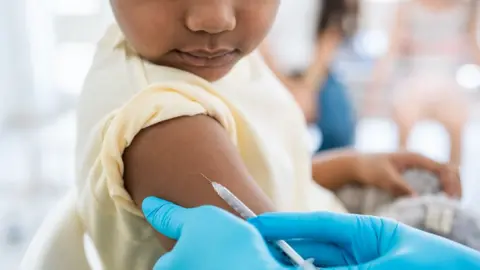[ad_1]
 Getty Images
Getty ImagesThe UK is at a “tipping point”, with low uptake of routine vaccinations putting children at risk of catching severe diseases, health officials say.
Stalling vaccination rates against some diseases, such as whooping cough and measles, means population immunity is no longer high enough to stop outbreaks.
Latest figures from the UK Health Security Agency (UKHSA), for January-March, show a small increase in some vaccinations, including a 0.3% rise in pre-school booster jabs given to under-fives.
But targets are still being missed.
The World Health Organization (WHO) target is for 95% of under-fives to be vaccinated.
And for the six-in-one jab – against whooping cough, polio and tetanus – and measles, mumps and rubella (MMR) vaccine this was exceeded in Scotland and Wales.
But for the UK as a whole:
- only 91.5% of under-twos had received the six-in-one jab – and among the whole under-five age group, the proportion was just 84.5%
- MMR1 coverage, given at the age of one, had dropped 0.5% to 92.5%
- MMR2, between three and five, had risen by 0.2% but only to 85.2%
The UK’s vaccine committee head, paediatrician Prof Sir Andrew Pollard, is “really worried” by the recent rise in whooping, or “100-day”, cough, also known as pertussis, which can be particularly serious for babies and infants.
“We’ve already seen some deaths from the most recent outbreak,” He told BBC News.
“We’re really at a tipping point, where there’s a real risk for more children getting seriously ill or [dying] from diseases we can prevent.”
Symptoms are similar to a cold – typically a runny nose and sore throat.
But after about a week, the infection can develop into coughing bouts that last a few minutes and are typically worse at night.
Young babies may also make a distinctive “whoop” or have difficulty breathing after a bout of coughing.
The bacteria spread through coughs and sneezes, so experts advise members of a family in which it has been diagnosed to stay at home until three weeks after the symptoms began or 48 hours after the patient started taking antibiotics.
Measles is another area of concern – the NHS launched a campaign earlier this year to encourage parents to vaccinate their children.
Cases have been rising since late last year, with clusters in a number of regions, including London, which had the lowest rate of child vaccine uptake in England.
Measles is one of the most infectious diseases known to humans – and when vaccination rates drop, it is most likely to spread quickly.
Although it normally clears up with within 10 days, complications can be nasty and include blindness, seizures and meningitis.
In some cases, it can kill.
[ad_2]
Source link







